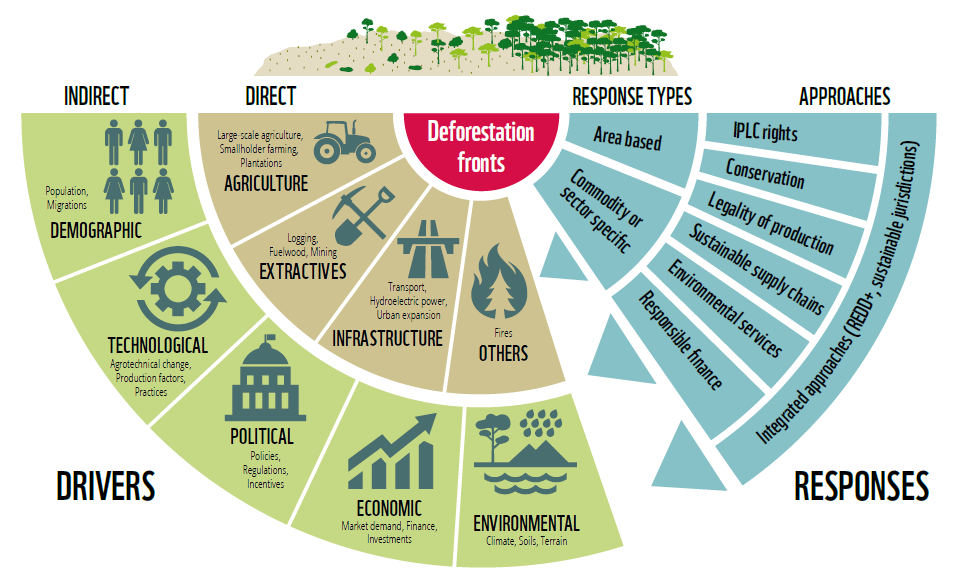In January 2021 the WWF launched a new report DEFORESTATION FRONTS: Drivers and Responses in a Changing World. The report covers 24 ‘deforestation fronts’ and analysis deforestation by connecting drivers and responses globally.
This new report focuses on the tropics and sub-tropics, which accounted for at least two-thirds of global forest cover loss from 2000 to 2018, and where forest fragmentation is significant. Clearly, deforestation remains a global problem, and this report is of great help to better understand and address this issue by linking drivers and responses.
The report excludes the social-environmental impacts of deforestation in its analysis of the 24 fronts. The absence of such an analysis in the report causes many adverse impacts on people and communities to remain in the dark for its readers. As can be observed in our database there are many more risks and impacts in the tropical timber value chain. Nonetheless, the reports highlight some interesting findings that may help companies addressing risks and impacts across environmental, social, and governance issues.
The WWF presents a framework that links drivers of deforestation globally and the existing approaches to address them. The reports analyses how these approaches address drivers. It’s important to note that the report does not assess the social-environmental impacts of deforestation on these 24 fronts. The absence of an analysis of the social-environmental impacts of deforestation is unfortunate since deforestation causes many adverse impacts on people and communities as can be observed from our database. Nonetheless, the report does cover some social aspects, mostly towards indigenous peoples and local communities. These aspects will be highlighted as it is interesting to observe what challenges and opportunities are identified and -more importantly- what solutions are presented.

Weak land and tenure rights are seen as a driver of deforestation, which in many cases also causes severe negative impacts on livelihoods and cultural losses. Encroachment on public lands and IPLCs ancestral lands are driven by speculation, sometimes linked to corruption, and it takes advantage of unclear tenure rights and weak governance. IPLC have tenure rights or manage approximately 1 billion hectares across 87 countries, one-quarter of the world’s land surface. Although progress is slow, countries are increasingly recognising and formalising IPLC tenure rights to forestland and/or forest resources, with 15% of forest areas are now legally owned or managed by IPLCs. This is an increase of nearly 40% from 2002 to 2017.
The recognition of indigenous peoples and local communities’ tenure rights, linked to community-based forest management, is a promising conservation strategy that is receiving greater attention. There is growing evidence that supporting forest management by IPLCs contributes to containing deforestation while supporting local livelihoods. Indigenous peoples and local communities can be especially effective as forest stewards in places where weak forest governance and law enforcement capacity cripple the government’s ability to safeguard public lands, yet in many cases indigenous peoples and local communities tend to face with greater pressures from other actors interested in getting access to extract the natural resources of their lands and territories. Therefore it is important to ensure that the enabling conditions are in place for communities to effectively manage lands, including protection of tenure rights and capacity of community members to manage production forestry as well as the financial feasibility of local initiatives, particularly the ones related to timber extraction. Empowering IPLCs, and their capacities to self-strengthen and manage their lands and territories, and to build the partnerships needed to deliver sustained positive impacts over time should be a priority. Many IPLCs require support to maintain and protect their acquired rights against external threats.
It can be concluded that working with IPLCs is of great importance in addressing deforestation. As the report states, empowering indigenous peoples and local communities should become a priority, as well as supporting their efforts to secure the tenure of their ancestral lands and safeguard their cultures. Though working IPLCs have to be included in a broader spectrum of measures, as expressed by the researchers “responses to address deforestation and its drivers need to be inclusive and tailored to the local and regional contexts. Solutions have been most effective when multiple response options are combined in ways through which they can establish reinforcing effects among each other.” More ambitious and inclusive public-private-people partnerships are therefore seen as a path forward to set up and target entire ecoregions that actively involve the participation of indigenous peoples and local communities.
The Local Impact Hub very much agrees with this vision and offers companies the support to put this into practice. Please don’t hesitate to reach out to us and learn more about how you can start your local journey.